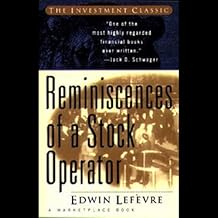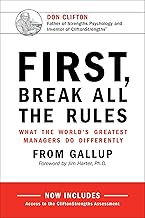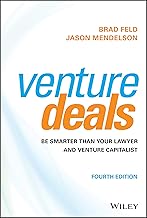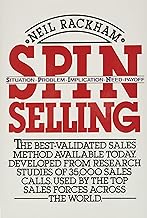
So Good They Can't Ignore You: Why Skills Trump Passion in the Quest for Work You Love
Cal Newport, Dave Mallow, et al.
4.5 on Amazon
37 HN comments

The Richest Man in Babylon: Original 1926 Edition
George S. Clason , Charles Conrad, et al.
4.7 on Amazon
37 HN comments

Basic Economics
Thomas Sowell
4.8 on Amazon
35 HN comments

Reminiscences of a Stock Operator
Edwin Lefevre, Rick Rohan, et al.
4.6 on Amazon
35 HN comments

First, Break All the Rules: What the world's Greatest Managers Do Differently
Jim Harter, Marcus Buckingham , et al.
4.6 on Amazon
34 HN comments

Venture Deals: Be Smarter Than Your Lawyer and Venture Capitalist
Brad Feld and Jason Mendelson
4.7 on Amazon
31 HN comments

Delivering Happiness
Tony Hsieh
4.6 on Amazon
30 HN comments

SPIN Selling
Neil Rackham
4.5 on Amazon
30 HN comments

Nickel And Dimed: On (Not) Getting By In America
Barbara Ehrenreich
4.3 on Amazon
29 HN comments

The Five Dysfunctions of a Team: A Leadership Fable
Patrick Lencioni
4.6 on Amazon
28 HN comments

The Startup Owner's Manual: The Step-By-Step Guide for Building a Great Company
Steve Blank and Bob Dorf
4.5 on Amazon
27 HN comments

Give and Take: A Revolutionary Approach to Success
Adam M. Grant PhD, Brian Keith Lewis, et al.
4.6 on Amazon
25 HN comments

Titan: The Life of John D. Rockefeller, Sr.
Ron Chernow
4.7 on Amazon
23 HN comments

The Challenger Sale: Taking Control of the Customer Conversation
Matthew Dixon and Brent Adamson
4.5 on Amazon
22 HN comments

Security Analysis: Principles and Techniques
Benjamin Graham and David Dodd
4.7 on Amazon
22 HN comments
dangoldinonApr 23, 2014
jaxnonDec 8, 2011
Venture Deals: Be Smarter Than Your Lawyer and Venture Capitalist
http://www.amazon.com/Venture-Deals-Smarter-Lawyer-Capitalis...
tschellenbachonSep 19, 2018
fludlightonOct 25, 2019
tzhenghaoonJan 24, 2018
[1] - http://a.co/aeI2gqq
dmourationDec 11, 2013
lopatinonNov 24, 2012
mhb_engonJan 28, 2019
sydneyliuonAug 25, 2015
Mark Suster, from Upfront Ventures, has a really great list of blog articles you can read about raising VC: http://www.bothsidesofthetable.com/pitching-a-vc/
This should give you a general idea of how VC's operate: http://founderequity.com/the-new-reality-of-venture-capital/
seattleengonJune 18, 2018
ilamontonJan 19, 2012
altmindonOct 25, 2019
The areas to lose money are: liquidation preferences, insuficient voting rights, dilution, different stock classes, general benefits to investor's equity compared to staff equity, investor drag-along, 409A valuation, options expiration or company staying private forever.
jerryjionDec 5, 2011
[1] http://www.amazon.com/Venture-Deals-Smarter-Lawyer-Capitalis...
motti_sonApr 4, 2012
While this isn't specifically about funding, many of the founders talk about their funding experience, because this tends to be a painful part for many of them.
As mindcrime mentioned in his comment, Brad Feld's Venture Deals is a great book, though focused on raising from VCs.
Another great source is not books but YouTube. The "This week in venture capital" series is usually interesting. For example here is the most recent episode, with Naval Ravikant, co-founder of AngelList: http://www.youtube.com/watch?v=JP_MJCASwsY
This way you don't only learn about startups and funding, but also about key players in the industry. I'm in the habit of watching those videos daily as I work out on my elliptical trainer... As I learn about a certain investor / founder in one video, I search for more videos of them. Some are more interesting than others. For example Mark Andreesen is always a pleasure to listen to.
If you prefer reading, some interesting relevant bloggers are Brad Feld, Fred Wilson, Chris Dixon and Mark Suster.
louhongonMay 24, 2012
little easier to get through (just of the top of my head):
-Losing my virginity (Branson)
-How to win friends and influence people (Carnegie)
-Venture deals (Feld)
-Man's Search for meaning (Frankl)
lpolovetsonMar 25, 2014
slap_shotonJuly 18, 2018
https://www.amazon.com/Venture-Deals-Smarter-Lawyer-Capitali...
glennononNov 14, 2019
(1) Finding VCs: Research online. Nowadays most VCs want to be known, and they have websites and blogs and Twitter accounts. Find the appropriate VCs and send them a short email with a link to your deck. Join founder communities such as YC's https://startupschool.org or https://openland.com.
(2) What to prepare: A pitch deck. https://blog.ycombinator.com/intro-to-the-yc-seed-deck/
(3) What to avoid: Inexperienced startup investors. Also, in the United States, unaccredited investors. Before taking money from an investor, you might talk to a founder of one of their other portfolio companies. Also avoid complex financial agreements: learn about SAFEs and convertible notes beforehand. Overall, you should just review all of YC's latest Startup School materials. https://www.startupschool.org/latest If that's not the way you like to learn, get a copy of Feld and Mendelson's Venture Deals book -- they also run a free online course twice a year.
(4) Common mistakes: Contacting VCs who were not appropriate for the business, location, and stage.
(5) The number one way to increase your chances for getting a VC investment is to not need the VC's money in the first place. A business that is growing exponentially creates its own gravity. Barring that, each investor will have their own priorities. For me, it is the speed of the founder's iterations and progress. That often means I meet the founders long before any serious consideration of investing (e.g., https://bothsidesofthetable.com/invest-in-lines-not-dots-611... )
pkaleronJuly 28, 2013
Let's say the company exits for $20m. Let's ignore preferred stock and assume it's all common to make the math easier. The syndicate would get $4m.
The first $1m would be payed back to the entire syndicate. The lead would get an additional 20% of the $3m or $600k. Then the rest of the $2.4m would be split amongst the syndicate.
Read chapter 9 of Venture Deals for more detail.
dxoapvonMar 3, 2015
Is there a service that takes care of all these problems automagically? I feel I'm very inexperienced to be able to handle all the tax/expense pitfalls (I'm not familiar with the US tax system).
Or at least a resource that describes everything that is needed from start to finish?
For example the book Venture Deals (by Brad Feld) describes the basics of venture funding, but is there any practical guide for incorporating?
I'm very reluctant to incorporate because I don't know if I will be able to handle all the bureaucratic mess and keep up with everything (time and cost wise).
Really liked the 'army of 1' phrase, I'm in the same situation.
bfeldonMar 1, 2017
tschellenbachonJune 7, 2017
1. The base offer. Many startups pay competitive or close to competitive salaries + equity.
2. The value of the options depends on your ability to pick the right startup and you believe that you can make a difference to the company. I have a friend who picked the right startup 4 times in a row.
3. Stock options are typically priced at 25% of the last round. The reason this is possible via 409a valuations has to do with the differences between common stock and preferred.
4. Issues with investors right impacting the value of your stock options are more problematic with later stage startups. Warning signs are companies that raised a lot of capital but didn't live up to their expectations. Those companies will often be under pressure to accept terms in later stage financing that could destroy founder and stock option pool upside.
5. Venture Deals by Brad Feld is a great read to understand different investment terms.
6. Yes you get more equity if you create your own company. Doing so is extremely risky, stressful and hard though. I'd guess that even with the extra equity, on average, you'll make more money working for one of the big companies.
7. So in a nutshell, starting companies, joining early stage companies. It really depends on your ability to pick the right company and perhaps more importantly your ability to make a difference.
Well that, and a bit of luck :)
iceyonMar 10, 2018
If you mean other parts of the business (operations, finance, BD, etc), the pattern is probably similar -- find a technical role that's in that org and start there, with the intention of moving into the business side more and more.
If you mean "I'm a software developer and want to understand the business side of running a company better", there is a ton of reading you can do to learn how businesses work. Some books that were helpful to me:
Ultimately business skills are gained the same way you'd learn software skills -- self-study combined with exposure to the problems you're interested in solving.
ttruongonJuly 22, 2015
hartem_onAug 17, 2019
pkaleronAug 13, 2013
That is terrible advice.
If you work at a startup then compensation will be a mixture of salary and equity. You should know your worth and negotiate your number when joining a startup. You should understand the details of the last financing: how much was raised? who were the investors? how long is the runway? what were the high-level economic terms of the deal?
You should ask around to see what is fair market terms for the options you should receive. You should do a search on angel.co/jobs and look at comparables.
Read Venture Deals by Brad Feld and Jason Mendelson even if you are not a founder. Founders and investors know this stuff. If you are naive going into your employment you may end up being screwed out of upside.
Get your papers straight.
guiambrosonSep 22, 2019
1) The Launch Pad: Inside Y Combinator, by Randall Stross
2) The Founder's Dilemmas, by Noam Wasserman
3) The Hard Thing About Hard Things, by Ben Horowitz
4) Zero to One: Notes on Startups, by Peter Thiel, Blake Masters
5) Venture Deals, by Brad Feld, Jason Mendelson (I haven't read, but heard good things about it)
ps: title is missing "ASK HN".
steventruongonDec 18, 2011
Link: http://www.amazon.com/Venture-Deals-Smarter-Lawyer-Capitalis...
Although again this isn't a book on the subject, here is a blog post talking about it: http://www.askthevc.com/wp/archives/2007/01/how-to-become-a-...
Also: http://www.quora.com/How-do-you-become-a-venture-capitalist?...
BrajeshwaronDec 9, 2020
Pretty much all books gives you something or the other to learn. I started writing about the books I read, each year, since 2018. For this year, here are few, in no particular order that I feel happy and fulfilled reading them. I will be digging deeper and doing a retrospective, and write a blog post by early 2021.
- Cant't hurt me by David Goggins.
- Digital Minimalism by Cal Newport.
- Ego is the Enemy by Ryan Holiday. (Re-read)
- Genghis Khan and the Making of the Modern World by Jack Weatherford. A very un-assuming book that taught me lot about leadership.
- How to influence and win friends (re-read 3rd or 4th time).
- Humble Inquiry by Edgar Schein.
- I am Malala (daughter like it and so I read it)
- Leonardo Da Vinci by Walter Issacson. (I'm taking this real slow, still reading after 6+ months.)
- Range (the one mentioned by Bill Gates)
- The Almanack of Naval Ravikant.
- The Future is Asian by Parag Khanna.
- Turn the Ship Around.
- Under Pressure by Lisa Damour (I have a daughter, turning teenager in another year.)
- Venture Deals (still valid in today's fund raising scenes)
- Why we Sleep by Matthew Walker. Still reading but learning a lot already.
mlichtensternonSep 26, 2014
I found out about it after taking several courses on www.Novoed.com including: "Technology Entrepreneurship" with Chuck Eesley (free, two-part course offered by Stanford University), "Startup CEO" with Matt Blumberg, "Venture Deals" with Brad Feld and Jason Mendelson, "The Startup Pitch" with +Chris Lipp, and "Raising Startup Capital" with Clint Korver. Miriam was previously CEO of Kauffman Fellows Academy.
I've referenced these courses and the type of opportunity MOOCs present on my personal blog while addressing the "Pipeline Problem" that has come up in relation to diversity numbers at major tech cos.
http://timesnewromanempire.blogspot.com/2014/08/is-entrepren...
bonesingeronNov 25, 2011
I have worked with fictitious clients in helping them incorporate, plan a business, initiate a stock purchase, asset purchase, and lastly, how to handle taxation.
I'm midway through The Lean Startup and unfortunately, I realize the startup field is dominated by engineers with inventions. I understand the purpose of funds like Ycombinator and techstars is to provide guidance for engineers and to help them understand the non-engineer aspects that go with running a company. I want some of that experience! They just don't offer it in my law school.
I've worked in a clinical program with real inventors, but it was directed towards helping them with trademarks and patents and not so much as helping them plan a business.